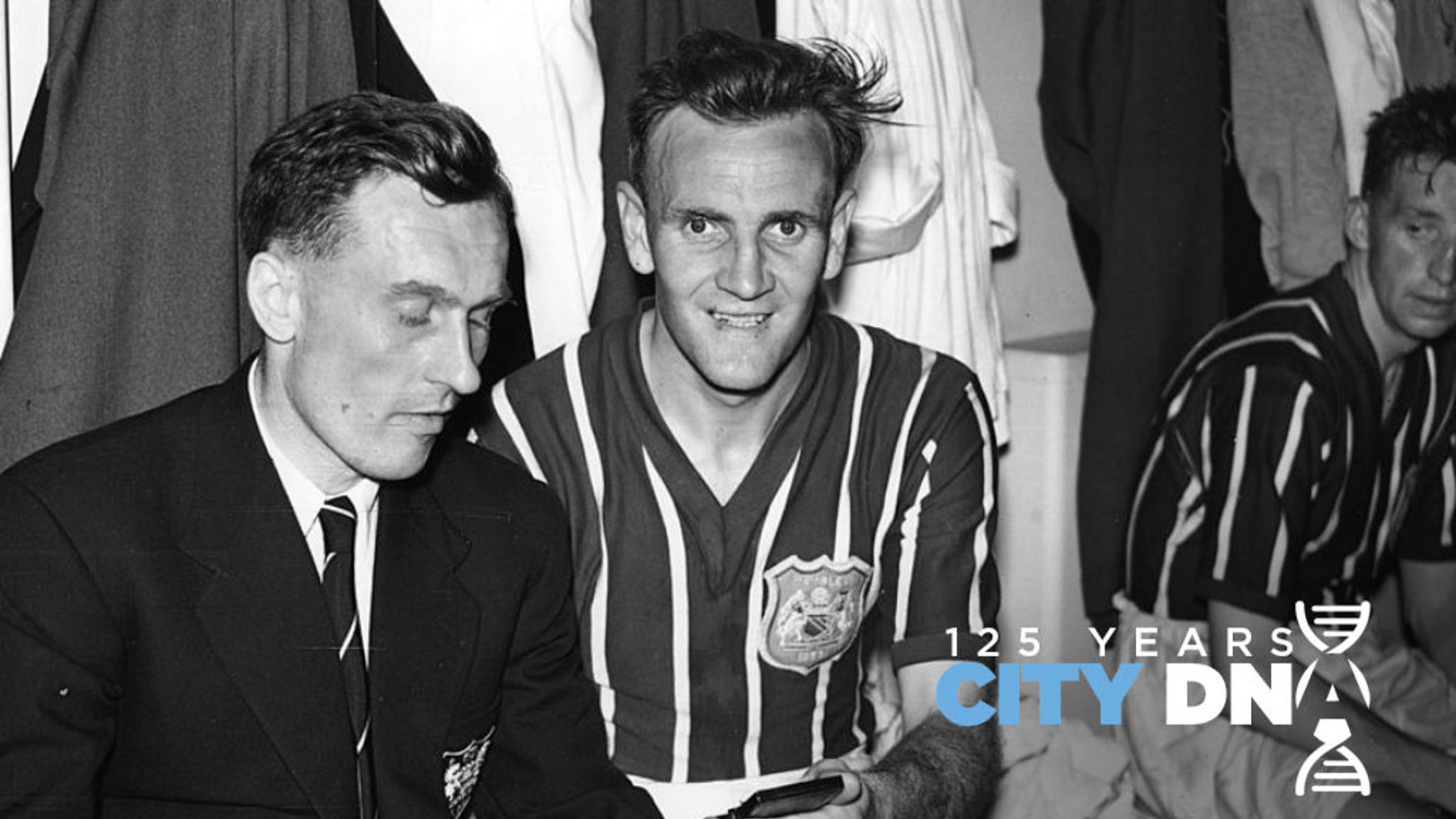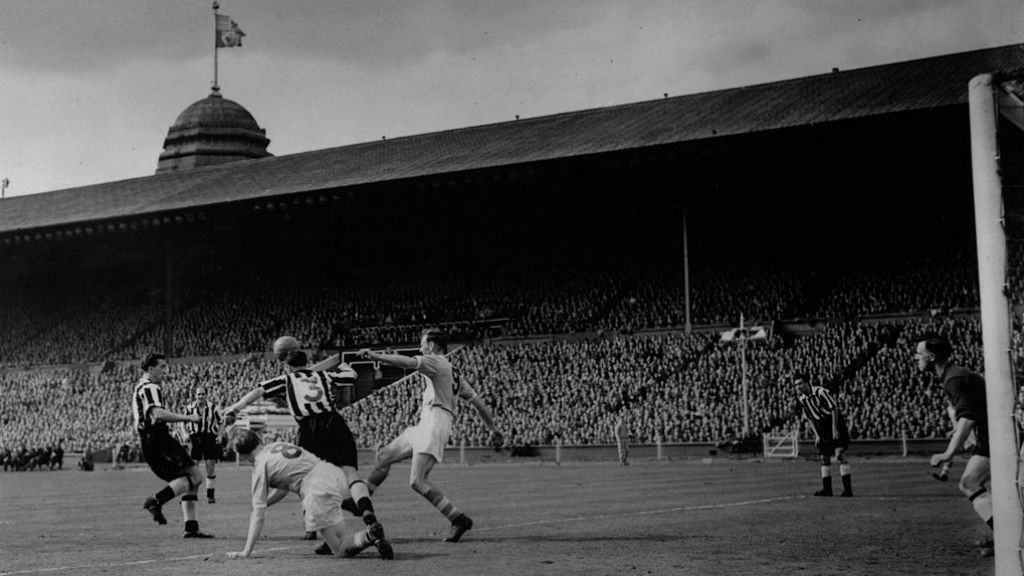#4 Don Revie: The man with a Plan
Who: He was the man with a plan who played a defining role not only in City’s 1956 FA Cup final triumph but in also helping reshape the face of British football.
To the wider public, Don Revie is chiefly remembered for his remarkable success as Leeds United manager and subsequent controversial reign in charge of England.
However, for City fans of a certain vintage, Revie is rightly revered as one of the Club’s finest post-war players.
A City career record of 41 goals from 178 appearances only scratches at the surface of Don’s huge impact in his time at Maine Road, a spell that culminated in FA Cup glory at Wembley and a revolutionary brand of play that bore his surname
Biography
Revie’s enduring legacy is as one of the most innovative yet controversial figures in post-war British football.
READ: City DNA #2 - Gentleman Max
WATCH: City DNA #3 - The Laundry Ladies
The straight-talking Yorkshireman become a household name for the way he transformed Leeds United’s fortunes during the 1960s and early 1970s.
Revie turned the Yorkshire side from English also-rans to one of the most successful – and feared – sides in Europe, guiding the club to eight major trophies in 14 years at the helm.
His highly-publicised spats with fellow high-profile manager Brian Clough – who ironically was to become Revie’s successor at Leeds – also became the stuff of legend.
Revie’s golden spell at Elland Road led to an ill-fated tenure as England manager between 1974 and 1977 - a period which saw the Three Lions miss out on qualifying for both the 1976 European Championships and 1978 World Cup finals in Argentina.
Some never quite forgave the fact that Revie subsequently quit the England role in order to take up a lucrative job in the United Arab Emirates.
Yet that would be to do Revie’s vision and forward thinking a huge disservice – as City fans of a certain generation would doubtless testify.
For during his own hugely successful playing career, especially during a five-year spell at City between 1951 and 1956, Revie garnered a reputation for being one of the most innovative and imaginative players of his generation.
BUY: Tickets for City v Watford
READ: Introducing City DNA
So much so that his skill, creativity and tactical acumen ultimately led to the innovation of a system that became known as ‘The Revie Plan’, a way of playing which helped both transform and revolutionise the English game over the second half of the 20th century.
Revie rocked up at Maine Road late in 1951 from Hull City but his first few seasons in sky blue proved to be challenging ones with Les McDowall’s side flirting with relegation from Division One.
However, Revie and City’s fortunes were to be transformed in 1954 a year after McDowall had watched spellbound – along with 100,000 other bewitched fans at Wembley - as Ferenc Puskas’ Hungary stunned England by winning 6-3.
McDowall saw first-hand how England’s defence was bamboozled by Hungarian centre-forward Nador Hidegkuti after he retreated into a deeper-lying role, behind the rest of the Magyars’ strike force.
Hidegkuti bagged a hat-trick that day, a feat which lit a spark in McDowall as he imagined how Revie could implement the same role with City.
Having initially trialled the scheme with City’s reserve team – who embarked on a subsequent 26-match unbeaten run - McDowall deployed the plan with City’s first team for the 1954-55 campaign.
A 5-0 loss to Birmingham in our season opener notwithstanding, it proved a revelation with City and Revie blazing a trail all the way to the 1955 FA Cup final where we were pitted against Newcastle United.
However, disaster struck at Wembley with City reduced to 10 men after an early injury to right-back Jimmy Meadows. With no substitutes available back then, the Revie Plan had to be shelved and with it went our hopes of Cup glory as Newcastle ran out 3-1 victors.
Twelve months later however, City – and Revie – were back under the Twin Towers, this time to face Birmingham City.
Ironically, Revie only played one game in City’s run to the final, but he was to prove the defining figure in the final.
Revie provided an assist for Joe Hayes’s opening goal and produced a man-of-the-match display as City put on a wonderful display to overcome Birmingham 3-1 and lift the Cup for the third time in our history.
It was to prove the highpoint of Revie’s time at Maine Road and by the Autumn of that year he had moved on to Sunderland before subsequently ending his playing days at Leeds prior to his remarkable and eventful move into management.
Tragically, after retiring from management Don was diagnosed with Motor Neurone Disease in 1987 and passed away just two years later at the age of just 61.
Controversy notwithstanding, he deserves to be remembered as one of the titans of English football – and a formidable part of City of folklore.
Trivia
Revie originally learnt the rudiments of the game using a small bundle of rags in the tiny yard behind his Teesside home. This influenced his thinking in later life, and he argued that young players should learn using smaller footballs, on smaller pitches, so they would be more adept in control when progressing to a bigger football.






